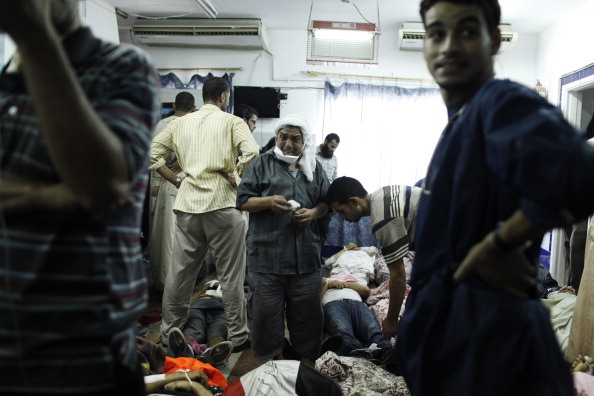
A supporter of deposed Egyptian President Mohammed Morsi stands among the bodies of dead pro-Morsi protesters on the floor of the Rabaa al-Adaweya Medical Centre in Cairo, Egypt (Photo Credit: Ed Giles/Getty Images).
Egyptian security forces can’t break old habits, and now the spirit of the 2011 Uprisings is in disarray.
For the third day in a row, security forces have attacked supporters for deposed President Mohamad Morsi, some of whom are armed and have fired back. Health officials put the death toll on Wednesday at 525, but that number has surely gone higher in the two days since.
The military has imposed a State of Emergency, inspiring memories of the abuses under the Mubarak regime facilitated by the special laws of a 30-year State of Emergency.
Outside of Cairo, sectarian violence has flared up. Mobs attacked more than a dozen Coptic churches on Wednesday, setting many of them on fire. Many Christians accused Morsi supporters of acting in revenge for Christians’ perceived support for the military. Regardless of the perpetrators, once again, Egyptian security forces have shown greater interest and ability in attacking political opponents than in protecting peaceful citizens.
Once again, Egyptian security forces have shown greater interest and ability in attacking political opponents than in protecting peaceful citizens.
For Amnesty International, this work begins with documenting what happened this week, both at the Cairo camps and at the church attacks throughout the country. Our researchers are on the ground and the day after the attacks, they were visiting hospital and morgues, taking testimonies from victims and relatives of victims and with doctors, a number of whom hadn’t slept in more than 24 hours.
What they found seems like an old story: While Amnesty International is still gathering information on the details, there are indications that, as in the past, the Egyptian security forces have used excessive force against demonstrators with catastrophic consequences. Last week, given the forces’ past record, Amnesty International called the decision to disperse the sit-ins a “recipe for disaster.” Now that warning has proved prophetic.
Based on their findings, here are five steps that offer the best hope for Egypt’s future:
- Reign in the security forces. The use of lethal force for the purpose of dispersing protesters is not lawful. Security forces must not use firearms against persons except in defense against the imminent risk of death or serious injury.
- End sectarian violence. Amnesty International is alarmed at reports of new sectarian violence against Coptic Christians. Revenge attacks must be treated as criminal acts. The organization has documented previous instances where the security forces have failed to protect Coptic Christian communities from such attacks.
- An independent and impartial investigation of human rights abuses. Egypt’s track record of impunity and ignoring human rights abuses indicate the government and judiciary are not up to this important job. Previous investigations have failed to deliver truth and justice for the victims. One option is give free access to an investigation led by U.N. Special Procedures officials to Egypt, in particular the Special Rapporteur on extrajudicial, summary or arbitrary executions.
- No abuse of State of Emergency powers. Under Mubarak, the State of Emergency was used to facilitate torture, hold prisoners in incommunicado detention, try civilians before military courts and other human rights abuses with impunity. There must be no military trials of civilians, and all detainees should have judicial safeguards.
- Protect women’s rights. Women were at the forefront of the 2011 uprising, but they quickly became marginalized following Mubarak’s resignation. Since the uprising, groups both military and civilian opposed to the uprising’s goals used women’s rights as a tool to denounce its aims and to undermine popular support for human rights in general. Even key secular political parties shied away from addressing the issue. Women activists were subject to sexual assaults as a means of silencing their activism. Yet, the collapse of a third way in Egyptian politics suggests that this is a central issue. What is needed is an Egyptian government that is open to all Egyptians, a quality that neither Morsi nor the military showed much interest in.
There’s also a question about what the United States should be doing. As President Obama said in his statement Thursday, this work is primarily for Egyptians, but there is a role for the United States and for the U.S. government.
The steps announced by the president did not go far enough. Amnesty International is calling for an immediate suspension of all transfers of tear gas; small arms, including shotguns, and light weapons and related ammunition; as well as armored vehicles until adequate safeguards are put in place by the Egyptian authorities to prevent further human rights violations.
We should try and make these 5 points very well known to the public over there! They need all the help they can get. They are fighting a giant.